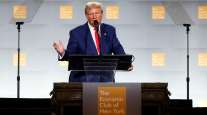Senior Reporter
ATA Praises USMCA Pact

[Stay on top of transportation news: Get TTNews in your inbox.]
The trade deal with Canada and Mexico that took effect at the start of the month garnered a strong endorsement from the leadership at American Trucking Associations.
The U.S.-Mexico-Canada Agreement, which replaced the North American Free Trade Agreement, is touted by President Donald Trump as a significant achievement during his first term in office. Administration officials, and stakeholders, have told lawmakers the new agreement solidifies the president’s pro-business legacy.
“This is a tremendous day,” ATA President Chris Spear said July 1. “It is the first significant revision in our nation’s trading relationship in nearly three decades and will foster growth in all three nations at a time when the economy can use a shot in the arm.”
“Very little changes for trucking today, but going forward, USMCA will not only keep industry in North America, benefiting trucking, it will likely attract new factories and economic activity, which will lead to more trucking activity,” said Bob Costello, ATA chief economist and senior vice president of international trade policy and cross-border operations. ATA noted that last year trucking was central in transporting 67% of the surface trade with Canada and 84% of it with Mexico. Doing so supported 89,500 full-time jobs.

Transport Topics introduces its newest digital interview series, Newsmakers, aimed at helping leaders in trucking and freight transportation navigate turbulent times. Audience members will gain access to the industry's leading expert in their particular field and the thoughtful moderation of a Transport Topics journalist. The inaugural episode — "Understanding Trucking's Economic Landscape" — featuring American Trucking Associations Chief Economist Bob Costello, will air live on July 9 at 2 p.m. ET. Registration is free. Sign up today.
“International trade, and specifically trade with the U.S. and Canada and Mexico are tremendous drivers of freight for our industry,” Costello said. “I expect that growth related to USMCA will provide a real boost for trucking in the coming years.”
The new trade deal is anticipated to add to annual U.S. exports to Canada and Mexico by about $33 billion above the previous trade deal’s baseline, ATA noted, citing an analysis. The Clinton-era NAFTA is credited with creating a $1.2 trillion annual North American trading partnership.
Several groups representing aspects of the business community, including the U.S. Chamber of Commerce, also praised the agreement’s implementation.
“USMCA modernizes our North American trading framework for the 21st century. It incorporates best-in-class provisions in areas such as digital trade, financial services and telecommunications. Through innovative new chapters, it facilitates the integration of small and medium enterprises into international trade, promotes competition and contributes to the fight against corruption,” U.S. Chamber of Commerce CEO Tom Donohue said in a statement. He was joined by Perrin Beatty, CEO of the Canadian Chamber of Commerce, and Carlos Salazar Lomelín, chairman of Mexico’s Consejo Coordinador Empresarial.
USMCA Facts by Transport Topics on Scribd
“Overall, the agreement increases our region’s competitiveness, which is vital in an uncertain international context characterized by protectionist temptations,” the statement said. “Nevertheless, the agreement was less than hoped for in areas such as intellectual property, procurement and labor mobility.”
USMCA is meant to promote economic growth and enhance regulations pertaining to intellectual property, digital trade, financial services and the environment. The environment chapter in the agreement, for instance, calls for comprehensive, enforceable obligations, according to the Office of the U.S. Trade Representative.
Trump signed the agreement into law this year, marking a bipartisan achievement for his administration.
“While NAFTA slashed wages and eliminated jobs, the USMCA includes groundbreaking labor protections for workers in both nations. This landmark agreement will bring countless jobs from overseas back to North America, and our countries will be very big beneficiaries,” Trump said at the White House on July 8. As a candidate, Trump campaigned against NAFTA, describing it as the “worst trade deal ever made.” As a candidate, and then as president, Trump — as well as critics of NAFTA — blamed it for reductions in the workforce across the manufacturing sector.
“We are already seeing the fruits because it started. It’s the largest, fairest and most advanced trade deal ever reached by any country, and it will bring enormous prosperity to both American and Mexican workers and Canada,” Trump added.

Grassley
On Capitol Hill, several senior lawmakers welcomed the new trade deal. Senate Finance Committee Chairman Chuck Grassley (R-Iowa) focused on potential benefits aimed at the agriculture sector, while noting the agreement takes place at a time when the three nations address health and economic concerns related to the COVID-19 pandemic.
“As we enter into this agreement, the world is navigating uncertain times,” Grassley said. “The unprecedented public health crisis has turned the economy upside down. Now more than ever, our farmers, businesses and workers need and deserve certainty they can count on to turn things around and accelerate the economic recovery.
Want more news? Listen to today's daily briefing:
Subscribe: Apple Podcasts | Spotify | Amazon Alexa | Google Assistant | More




